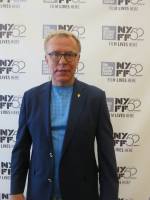 THE "RUSSIAN FIVE," FETISOV TOP RIGHTA quick and personal history of Russian hockey and hockey players from the Cold War through Glasnost and beyond
THE "RUSSIAN FIVE," FETISOV TOP RIGHTA quick and personal history of Russian hockey and hockey players from the Cold War through Glasnost and beyondAnyone interested in the nexus of sports and politics during a key period of the modern era must want to watch Ukrainian-American Yale hockey player and filmmaker Gabe Polsky's
Red Army. But bear in mind: archival footage and hockey reels, tight editing, and humor notwithstanding, this is a standard talking-head documentary.
The story is interesting and the principal talking head is an impressive guy. At 56 Viacheslav "Slava" Fetisov, who takes over the film in the first few minutes, has led a richer life than most. For thirteen years 1976–89) he played for the Red Army Russian national ice hockey team, the best of the best. Then he quit the team because of conflicts with the coaching, and played in the US with the NHL (1989–98), pioneering in this sports immigration process that had been strictly forbidden under Soviet rule. Former teammates came to the NHL, which enabled him for a while to play again as part of legendary Russian Five, one of the most powerful units in hockey history, including himself, high-scoring right-winger Sergei Makarov, left-winger Vladimir Krutov (AKA "the Tank”), tough and wiry center Igor Larionov (“the Professor”) and fellow defenseman and best friend Alexei Kasatonov. He helped win two Stanley Cups in '97 and '98. Then he coached for four years (1998-2002) -- leading his American teams to great successes. In 2002 he returned to Russia with his wife, going on on to coach the Russian national team in the totally different post-Soviet world, under Putin serving (till 2008) as the Russian Minister of Sport.
The villain of the piece is coach Viktor Tikhonov, a cruel task-master who hardly treated his players as humans, insisting on having them live apart from family eleven months a year and forbidding Fetisof from visiting his father on his deathbed. Tikhonov was brought in after the notorious defeat of the Russian national team by a group of relatively green US college players in the Winter Olympics at Lake Placid in 1980. The benevolent, and more complex, spirit of the film is legendary coach Anatoly Tarasov, who introduced metaphors from chess and ballet into play, along with imaginative and fun training methods that were at the same time rigorous and grounded in socialist concepts of placing teamwork over individualism. The great players were like brothers and somehow fundamentally the same.
A shortcoming of this fast-moving film is that despite describing the unique features of classic Russian hockey style -- intricate, complicated, inventive, balletic, relying a lot on passing back and forth -- this is never satisfactorily contrasted with American (or European) style, not in a manner than anyone not thoroughly familiar with the game would perceive. A major strength and a key to its warmth and life is the friendly, humorous, almost father-son relationship between young Polsky and big shot Fetisov -- whose gently Russian-accented but articulate English dominates the film and who tends to use talking on his cell phone as an excuse when Polsky asks him an uncomfortable question. Fetisov never defected, and he represents Russia, despite his years in the US. He is critical of the chilly Tikhonov, but never of the Russian system. He has been involved recently in managing the many hirings of Russian hockey players abroad, but seems even more proud of having supervised establishment of a wide infrastructure of hockey stadiums throughout Russian during his Sports Minister tenure. In some ways he is clearly nostalgic about a Soviet system that pointed him, as an anointed national athlete from age 16, toward an illustrious career. Back in the day, after that freak 1980 defeat, his team smashed Gretsky and his Canadian team.
Red Army, 85 minutes, debuted at Cannes, and has played in over a dozen international festivals. Screened for this review at the 52nd New York Film Festival as part of its Spotlight on Documentary series. At the Q&A Fetisov and Polsky were both present, and Fetisov began by calling Polsky "a good boy." A Sony Pictures Classics release. Releases are set for 14 Nov. 2014 (NYC) and 22 Jan. 2015; 19 June 2015 in the UK. Coming to San Francisco Embarcadero Cinema 9 February 2015.
 FETISOV AT THE 52nd NYFF [CK Photo]
FETISOV AT THE 52nd NYFF [CK Photo]




